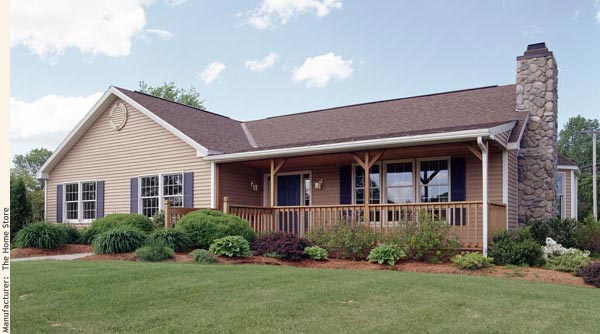 |
 |
A brief summary of Chapter 5 "Selecting a General Contractor" (20 pages) in The Modular Home , by Andrew Gianino, President of The Home Store
There are three types of construction tasks that need to be completed to build a modular home: the site work, the button-up work, and the construction of site-built structures. Someone needs to be in charge of hiring all of the trades people needed for these tasks, coordinating their schedules, and overseeing their work. That is the job of the general contractor, often known simply as the GC. The GC can be a modular dealer, independent professional, relative, friend, or even yourself. He may have years of experience, or this may be his first job. He may have worked on many modular homes over the years, or never seen one before. He may or may not be licensed.
As a general rule, the best choice for a GC meets the following criteria:
-
He is experienced and licensed
-
He has prior modular-home experience
-
He is also the dealer who sold the home or someone who has worked closely with the dealer in the past
This chapter explains why hiring a GC with these credentials serves most customers well. It also looks at several other options that a customer's personal situation or inclination may lead them to consider. The latter road is full of potential pitfalls, which can be largely avoided if the risks are recognized upfront and taken seriously.
Why Select An Experienced and Licensed General Contractor?
On any construction project, the GC has a full list of responsibilities and duties that are both difficult and time-consuming. A professional, experienced GC is best equipped to handle each of them competently. When problems occur, as they do on every job, he solves them quickly. Better yet, he anticipates problems as a matter of course and heads them off before they become a threat. A licensed GC knows the building codes, which is important not just because following them is the law, but because they protect the customer's health and safety. In short, although it is considerably easier to build a modular home than a stick-framed home from scratch, most modular-home customers benefit substantially from the assistance of an experienced, professional GC.

The classic details of this house fit in both old and new neighborhoods
Here are just some of the more important jobs on a modular-home project:
-
Obtain competitive bids
-
Help determine the scope of work
-
Help determine the building specifications
-
Select each subcontractor and sign a contract detailing the scope of work, building specifications, and price
-
Create and manage the schedule for materials and subcontractors, including the sequence of each subcontractor to maximize productivity and reduce conflict
-
Ensure the job is ready for each subcontractor before instructing him to begin
-
Revise the schedule weekly to adjust for inevitable delays, such as weather, inspectors, and illness
-
Ensure that work is done to accepted industry standards as well as to the customer's satisfaction
-
Ensure that any warranty problems that occur after the job is done and after each subcontractor is paid are taken care of
As this chapter explains, a professional GC completes each of these tasks more competently. In addition, a seasoned GC:
-
Calls upon a number of subcontractors to obtain competitive bids for each construction task
-
Knows which subcontractors to avoid because of a history of poor workmanship, unreliability, and unethical pricing
-
Gets the subcontractors to perform in a timely fashion
-
Helps navigate the approval and permit steps that must be completed prior to beginning construction of a new home.
-
Accepts responsibility for constructing the house in compliance with the building codes when he signs the permit application
-
Enables you to build a home in those states that prohibit inexperienced homeowners from building modular homes without the oversight of a licensed contractor
-
Enables you to obtain financing from those lenders who require you to employ a professional GC
-
Has the necessary insurance to protect against something going wrong on the building site, such as an accident causing a serious personal injury or significant property damage to the home
Why Select A GC with Modular-Home Experience?
Any good stick builder can build a garage, porch, or deck, or finish the basement in a modular home. A foundation contractor does not need modular experience to make a good modular-home foundation as long as he follows instructions. Many of the other jobs, however, benefit greatly from someone who has solid experience with modular homes. The excavation contractor, for example, must prepare the site for the delivery and set of the modules. Even contractors with years of excavation experience routinely underestimate the logistical difficulties of maneuvering modules that are often long, usually wide, and always heavy.
The button-up work requires the most specific knowledge of modular construction. There are aspects of the plumbing, electrical, and HVAC work that are unique to modular construction, and there are many interior and exterior carpentry tasks that involve modular-specific skills. Skilled GCs who lack experience with modular homes often get into trouble when they take on modular jobs. GCs who have modular experience, however, know which construction tasks must be completed, how to complete them, and in what order, for any particular house design. They supplement their trade knowledge by using subcontractors who themselves have modular expertise.
Seasoned modular GCs understand the difference between their button-up responsibilities and true warranty issues. They know that manufacturers expect them to repair and adjust components of the modules that need some additional work because of the delivery and set. Repair of minor drywall cracks, adjustment of miter joints, and realignment of windows and doors are considered normal GC responsibilities. GCs with modular experience know to budget time and money to complete this work.
GCs with modular experience also save you money because they know how much to charge for specific tasks. They do not have to pad their price estimates to protect themselves from their own inexperience.
This is not to imply that an inexperienced GC cannot learn. A well-informed customer, armed with the information presented in this book, could help a GC understand the unique aspects of modular building.

The Home Store's Sugarloaf 5 model home with a front porch
Why Select Dealers Who Are Also General Contractors?
The ideal situation for someone buying a modular home is to work with a dealer who can also function as the GC. This chapter explains how having one person in charge of the whole project offers the following benefits.
-
A dealer - especially one who has been building modular homes for a few years - has acquired the requisite construction knowledge
-
A dealer - especially one who has been with the same manufacturer for a few years - knows specifically what the GC must do to button-up this manufacturer's homes
-
Since the dealer usually cares more about the quality of a finished home than anyone except the homeowner, a dealer acting as the GC is motivated to do a first-rate job on every aspect of the home
-
You avoid having to interview people for both jobs, prepare and sign separate contracts, ensure all required tasks are covered in one or the other contracts, and mediate disputes
-
A modular dealer who does the GCs work is responsible for ensuring that both function's schedules are coordinated
-
Because the dealer is also making profit on the sale of the house, he can usually charge less than an independent contractor for the GC work.
-
You avoid the problem of the dealer and GC attempting to avoid responsibility for a warranty issue by pointing the figure at the other party, which is sure to leave you taking the loss
Other General-Contracting Options
Many people take pride in acting as general contractors on their own home construction. For those who do, increasing numbers are finding that modular homes are much easier to manage than stick-built homes, since they reduce responsibilities to a manageable level and afford a greater measure of control. People often enlist the help of relatives and friends in these projects.
Some people do this quite well. They have the right personality, the supervisory and management skills, and the necessary time. Their relatives and friends may have prior construction experience that allows them to bring the project in on budget and on schedule, allowing them all to celebrate their success in a wonderful house-warming party. Often, however, things do not go this smoothly. Since you may be considering hiring relatives and friends or acting as your own GC, this chapter takes a close look at many of the potential pitfalls of doing so.
Better Ways to Save Money
People who think they will save significant money by acting as their own general contractor are wrong more often than right. This chapter discusses the following three options for a budget-conscious customer. It also discusses how to hire a GC as a "construction manager". This arrangement allows you to hire your own subcontractors and purchase your own materials, thus eliminating the GC's markup for these jobs. The advantage is that you get to retain some expert guidance you would not otherwise have.
Comparing GCs
A competent GC requires a different set of skills than a competent modular dealer, and the screening process needs to take these differences into account. Even if you are using the same person for both jobs, look at his competence in each field separately. It is also important to look closely at your GC's skills even if you have already selected him because he is a friend or family member. After all, you want to know his strengths and weaknesses. If you are assuming the role of GC, shop for subcontractors using the same advice offered here.

This chapter answers the following questions:
-
How can you find candidates to serve as your GC?
-
How long will it take to identify candidates, verify credentials, and receive and review estimates?
-
What questions should you ask your candidates?
-
What questions should you ask the customer referrals given you by each candidate?
-
What other steps should you take to verify the competency of each candidate?
-
What responsibility does each candidate have for helping you with the following?
-
Designing your site-built structures, such as the garage and deck
-
Determining which contracting tasks are required to complete your home
-
Selecting your preferred building specifications
-
How much detail do you need with the written pricing and specifications?
-
How should each candidate handle tasks he is not completing?
-
What should you be on the lookout for when reviewing each candidates GC estimate?
-
When are allowances sensible and when not?
-
What do you do if you get one very low estimate?
-
What language do you need included in the written contract to protect yourself with regard to cancellation options, change orders, price adjustments, payment terms, construction schedule, insurance, and warranty?
-
If you are hiring your own subcontractors, what additional steps must you complete?
-
What are your responsibilities for keeping your GC informed of your discussions with your modular dealer?
Chapter Index
To learn more about building a modular home, read excerpts from the other chapters of The Modular Home (325 pages), by Andrew Gianino, President of The Home Store:
Chapter 4: Specifications and Features
Chapter 5: Selecting a General Contractor
Chapter 6: Finding and Preparing a Building Lot
Chapter 7: The General Contractor's Responsibilities
Chapter 8: Building a Modular Addition
Chapter 9: Financing a Modular Home
Chapter 11: Building on Schedule
|